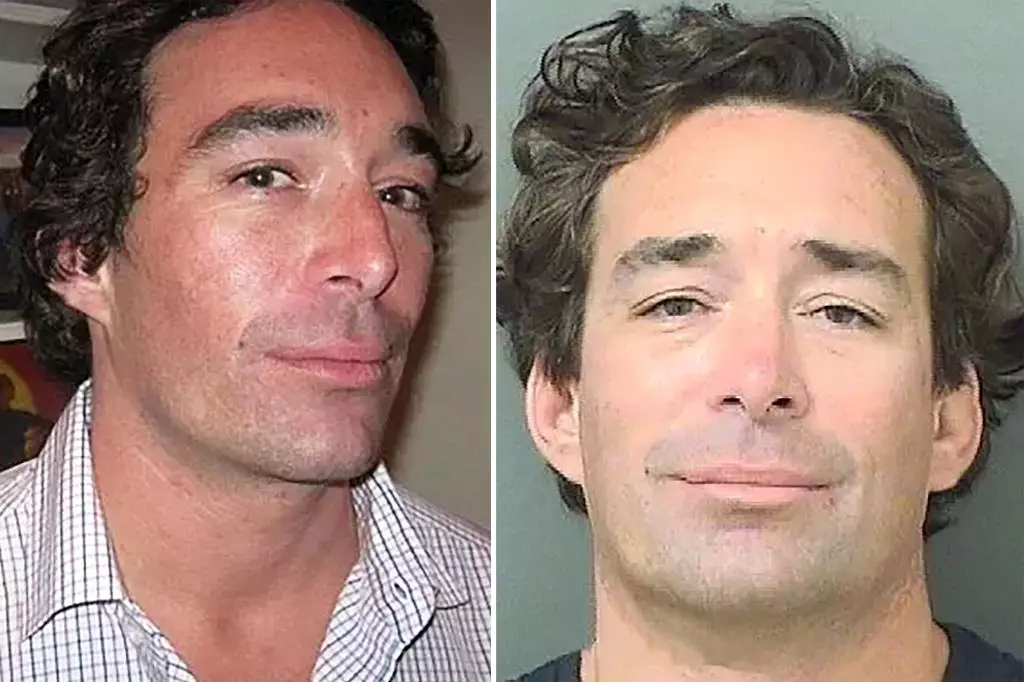The case of Alexander “Nico” Fanjul, a scion of a prominent sugar dynasty, shines a glaring light on the darker aspects of privilege and power. Recently, Fanjul’s guilty plea regarding a domestic violence incident has not only made headlines but also raised profound questions regarding accountability among the elite. The circumstances surrounding his arrest and subsequent legal repercussions lay bare a fascinating yet troubling narrative that intertwines wealth, entitlement, and the quest for redemption.
The Incident: A Scene of Disturbance
Fanjul’s troubles began in January when local authorities were summoned to his Palm Beach residence following urgent 911 calls. Upon arrival, police found a woman in a vulnerable state, reeling from apparent physical assault. According to the police report, she was in a defensive posture, bleeding and fearing for her life. This alarming depiction contrasts sharply with the opulence typically associated with Fanjul’s social status and family legacy. The incident reportedly escalated after a disagreement arose during a dinner at the prestigious Flagler Steakhouse, where Fanjul allegedly lashed out in response to being seated next to a same-sex couple. This moment reveals the fragility of the elite’s social decorum and its disintegration in the face of personal outrage.
Shortly after the violent episode, the legal repercussions unfolded. Fanjul was charged with multiple offenses, including felony battery, and was sentenced to four years of probation accompanied by community service. This judicial outcome, while significant, raises questions about the effectiveness of legal measures imposed on wealthy individuals. The statement released by Fanjul’s representative echoes a familiar narrative among the affluent—pledging to improve oneself while strategically managing public relations. Such claims can come across as disingenuous, particularly in light of the severity of the allegations against him.
The Cycle of Violence: A Portrait of Repeated Offenses
What makes Fanjul’s case even more troubling is his history. Following the initial incident, reports revealed another troubling episode in April, where he allegedly tackled yet another girlfriend. Claims of a longstanding pattern of violence emerged, casting doubt on the prospect of genuine reform. It is imperative to consider how often individuals in positions of privilege can evade serious consequences, particularly when past incidents of violence either went unreported or were dismissed.
The recurring nature of these accusations paints a worrying picture of not only Fanjul’s behavioral tendencies but also sheds light on how domestic violence is often trivialized or overlooked, especially among elites. The fact that there were previous allegations against him—including ones involving ex-girlfriend Tinsley Mortimer—highlights broader societal issues regarding domestic abuse. The cyclical nature of violence in relationships often leaves victims voiceless, which raises ethical concerns about the efficacy of our judicial system in providing meaningful protection.
Fanjul’s subsequent enrollment in a luxury rehabilitation program punctuates a theme prevalent in cases of affluent individuals facing legal troubles. His move to seek treatment at a high-end facility amid such serious allegations serves not just as a potential pathway to recovery, but also reflects an escape from the gritty realities of accountability. While rehabilitation is undoubtedly a critical component of personal recovery, the elite often navigate these systems in ways that can effectively shield them from the consequences of their actions.
Moreover, the fact that he was permitted to continue outpatient treatment in a picturesque locale signals a systemic issue where wealth becomes a buffer against the repercussions of one’s actions. Fanjul’s privileged access to resources raises questions about equal justice under the law, reminding us that for many, the struggle for recovery might not come with the same luxuries.
Fanjul’s case invites essential discussions around domestic violence and the societal structures that perpetuate it. The victims of such incidents deserve undivided attention and support, rather than having their narratives lost in the social chatter surrounding the perpetrators. Ensuring accountability for individuals, regardless of their social status, is critical in fostering a society that does not condone violence in any form.
As we navigate this discussion, it becomes increasingly important to advocate for policies that not only protect victims but also address the root causes of violence, offering a pathway for genuine societal change. Ultimately, the case of Alexander “Nico” Fanjul exemplifies the urgent need for a re-evaluation of how we view privilege, accountability, and redemption in an era where social disparities continue to plague justice systems worldwide.

